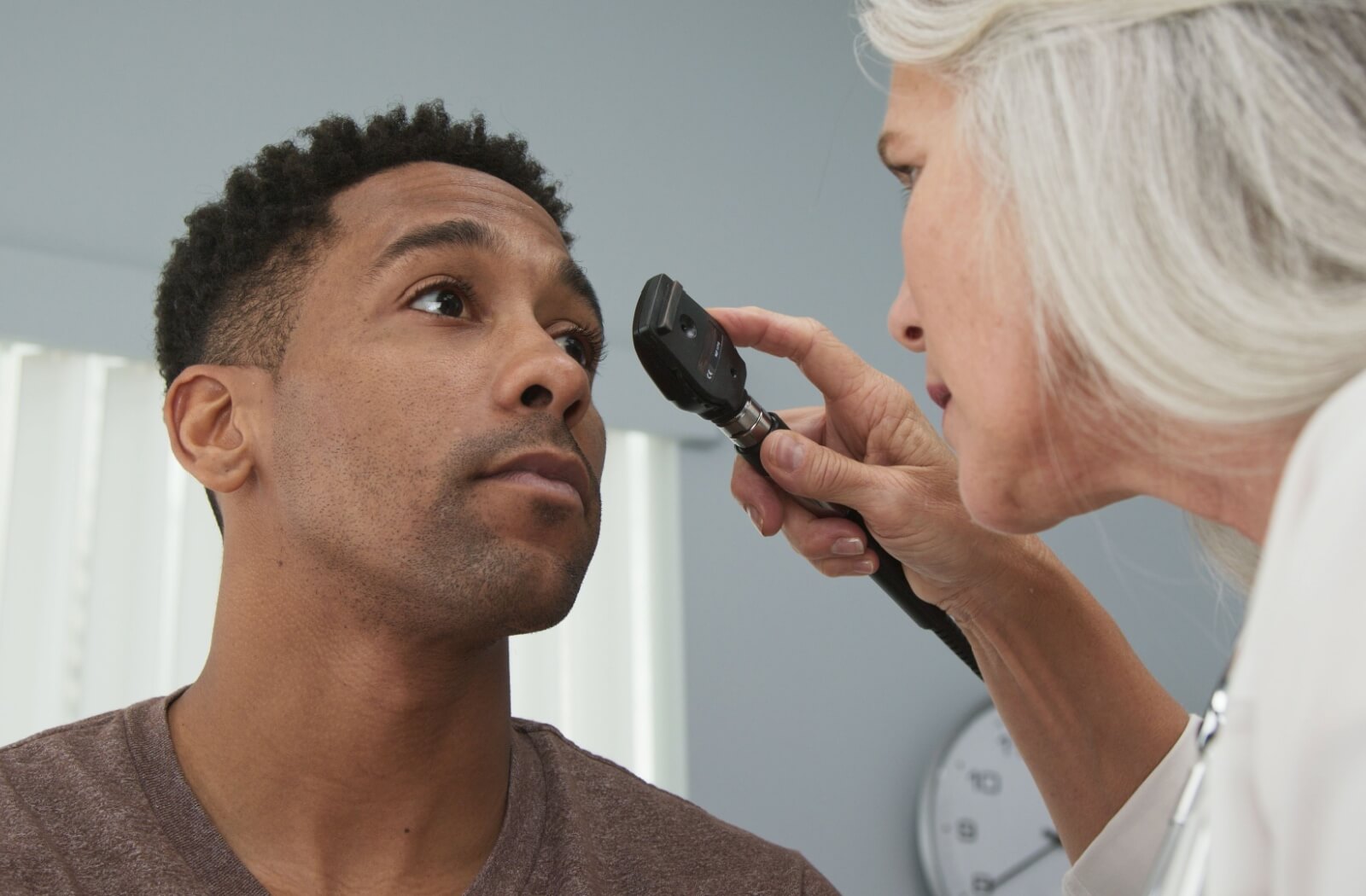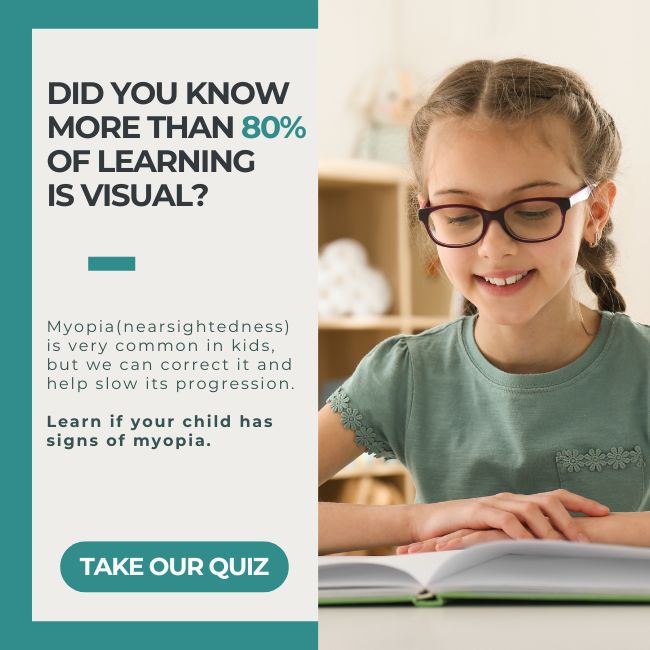Our vision is precious, so it’s essential to prioritize its health with regular eye exams. Eye exams are vital for detecting vision issues and eye disorders and uncovering other medical conditions such as high blood pressure and diabetes.
Adults and seniors should schedule an eye exam at least once every year. Depending on your eye health, your eye doctor might recommend more frequent visits. As for kids, our optometrists advise scheduling your child’s first eye exam at 6 months of age, followed by annual check-ups.
During your first eye exam, expect a review of your medical history, vision tests, an examination of eye health, and possibly eye dilation to get a better view of the retina.
Preparing for Your First Eye Exam
Your first eye exam will begin with a thorough discussion about your medical history and any vision problems you might be experiencing. The optometrist will ask questions about:
- Your overall health and any medications you’re taking
- Family history of eye diseases
- Specific symptoms or changes in your vision
Planning for your eye exam can ensure it goes smoothly. To prepare:
- Consider any health issues, injuries, or operations you’ve had recently.
- If you wear glasses or contacts, bring them along for a potential prescription update.
- A list of your current medications may help the optometrist assess if they could affect your vision.
- Have your vision insurance information ready.
Additionally, bring your most recent prescription eyeglasses, sunglasses, and contact lens labels or boxes to discuss all needs and possible adjustments with your optometrist.
If your exam includes dilation, arrange for a family member or friend to drive you home afterward.
What’s Included in an Eye Exam?
Given the vital role our eyes play in our lives, it’s important to know what to expect during an eye exam. Eye exams are essential for ensuring your prescription is up-to-date and your eyesight is supported.
An eye exam typically takes between 20 to 60 minutes, though it can occasionally take longer depending on what’s included. The types of tests performed typically include:
Visual Acuity
A visual acuity test measures your ability to see letters or symbols from a distance. Common tests include the Snellen and random E acuity tests:
- Snellen Test: Uses a chart with letters arranged in rows and columns to assess how well you can read from 14 to 20 feet away.
- Random E Test: Measures your ability to identify the direction of the letter “E” (up, down, left, or right).
Intraocular Pressure
A handheld tonometer applies gentle pressure to the surface of your eye to measure intraocular pressure and check for signs of glaucoma, which can damage the optic nerve and lead to blindness.
Eye Health Evaluation
Your optometrist will perform a slit-lamp examination to view the structures at the front of your eye under high magnification.
Advanced Retinal Imaging
During your comprehensive eye exam, your optometrist may utilize advanced retinal imaging technology to capture detailed images of the back of your eye. This non-invasive technique provides a high-resolution view of the retina, optic nerve, and blood vessels, enabling early detection of potential issues like macular degeneration, glaucoma, and diabetic retinopathy.
Retinal imaging is a valuable diagnostic tool that allows your eye doctor to monitor your eye health closely and track any changes over time, ensuring timely interventions when necessary.
Dilated Eye Exam
Dilated eye exams give your eye doctor a clearer view of the back of your eye and help detect various eye issues and signs of other health problems like diabetes or brain tumors. Special eye drops are used to widen your pupils, allowing for a closer examination with bright light. The effects of dilation last for 2 to 4 hours, causing temporary difficulty in seeing objects up close and increased light sensitivity.
Additional Testing If Required
Peripheral Vision Testing
This assessment evaluates your side or peripheral vision, which is crucial for activities like driving and sports. During the test, you’ll focus on a central point while indicating when you can detect objects or lights appearing in your peripheral field of vision.
OCT (Optical Coherence Tomography)
OCT is a revolutionary imaging technique that creates detailed, high-resolution cross-sectional images of the retina and optic nerve. This non-invasive test allows your eye doctor to precisely measure and evaluate the various layers of the retina, enabling early detection and monitoring of conditions like glaucoma, macular degeneration, and diabetic eye disease.
Benefits of Scheduling Regular Eye Exams
Scheduling regular eye exams is important for maintaining overall eye health and vision quality. Some of the many benefits include:
- Early Detection of Vision Problems: Regular eye exams help detect vision issues like nearsightedness, farsightedness, and astigmatism early.
- Monitoring Eye Health: Eye exams can detect early signs of eye diseases that may not have noticeable symptoms initially, such as glaucoma, cataracts, and macular degeneration.
- Identifying Other Health Issues: Eye exams can reveal signs of other health problems, such as diabetes, high blood pressure, and high cholesterol.
- Updating Prescriptions: Vision can change over time, and regular exams ensure that prescriptions for glasses or contact lenses are up to date, which is crucial for optimal vision and comfort.
- Preventing Eye Strain: As time in front of digital screens increases, more people experience eye strain. An optometrist can recommend solutions to reduce eye strain, such as special eyeglass lenses or ergonomic adjustments to your workspace.
- Promoting Good Vision for Life: Maintaining regular check-ups supports lifelong vision health. This is especially important as the risk of eye diseases increases with age.

Discussion & Recommendations
After all tests are completed, your optometrist will discuss the results with you. They’ll explain if you need glasses or contacts, recommend lifestyle changes, or schedule follow-up appointments if necessary.
Taking these steps helps ensure your first eye exam is comprehensive and sets the foundation for maintaining healthy vision.
Final Insights on Your First Eye Exam
Your first eye exam is an essential step towards maintaining optimal eye health and ensuring clear vision. By knowing what to expect, you can approach the appointment with confidence and make the most of your time with the optometrist.
From the initial consultation to visual acuity tests, refraction assessments, and various health evaluations, each part of the exam is designed to give a comprehensive picture of your eye health.
Regular eye exams are crucial for early detection of potential issues, allowing for timely interventions to preserve your vision. So, whether you’re experiencing vision problems or just taking preventive measures, scheduling that first eye exam is a proactive move toward a lifetime of healthy sight.
At Insight Eyecare, we are committed to providing you with personalized eye care services. Take the first step towards better vision and healthier eyes by booking your appointment today.







